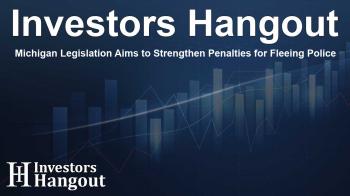Michigan Legislation Aims to Strengthen Penalties for Fleeing Police

Michigan Legislation Aims to Strengthen Penalties for Fleeing Police
Evading police is not just a minor infraction; it poses a serious threat to public safety. High-speed chases initiated by offenders can lead to reckless driving, causing dangerous situations on the roads. Innocent individuals—drivers and pedestrians alike—risk their lives due to the actions of those fleeing police. It's a growing problem that needs urgent attention.
Rising Incidence of Fleeing Police
Recently, a troubling trend has emerged in Michigan, mirroring patterns observed across various states. Offenders have become emboldened by no-chase or limited-chase policies implemented by law enforcement agencies. They know that these policies may hinder police from pursuing them vigorously, putting everyone on the road at risk.
New Legislation Proposed
In response to this disturbing rise in incidents, Representative Rylee Linting has introduced a significant piece of legislation in the Michigan House of Representatives, known as House Bill 4690. This bill aims to amend Michigan's criminal code to establish stricter penalties for individuals who flee from police officers. By mandating minimum prison terms, this bill is poised to enhance the legal framework surrounding such infractions.
Pursuing Accountability
House Bill 4690 proposes categorizing evading police into four levels based on the severity of the crime. Factors taken into account include whether the evasion resulted in a car accident, serious injury, or if the suspect has prior convictions. The consequences for such actions could range from 182 days in jail to a maximum of five years in prison, depending on the specifics of the case.
Support from Law Enforcement Advocates
Paula Fitzsimmons, the Legislative Director of the National Police Association, has expressed strong support for the bill. She stated, "Instances of fleeing from police have surged due to offenders exploiting the no-chase policies enacted by local governments. This rampant lawlessness is damaging lives and must be met with stricter consequences." By advocating for mandatory minimum sentences, the National Police Association believes this proposed legislation can help curtail the reckless behavior associated with fleeing police.
A Call to Action
The National Police Association applauds Representative Linting for advancing this critical legislation. The organization recognizes that the rise in fleeing incidents threatens the safety of the community. They are dedicated to supporting measures that hold accountable individuals who exhibit blatant disregard for the law and the safety of others. They urge all Michigan legislators to back this bill and encourage similar initiatives in other states dealing with the same issues.
Supporting Future Anti-Crime Initiatives
To promote a safer environment and bolster law enforcement efforts, citizens are encouraged to rally behind this and other anti-crime initiatives. The National Police Association is forming a team that will provide alerts about important legislative matters, informing community members about which representatives to contact regarding these bills. Getting involved can significantly impact ensuring that laws protect the community from dangerous offenders.
About the National Police Association
The National Police Association (NPA) is a dedicated nonprofit organization that focuses on advocating for law enforcement and supporting their work through education and legal means. Their commitment is evident through their ongoing efforts to improve police-community relations and uphold the rights of law enforcement officers.
Contact Information
For those interested in learning more or supporting the NPA's initiatives, they can reach out to Paula Fitzsimmons at 3024691765. The organization is eager to connect with community members and share their mission of fostering a safer society.
Frequently Asked Questions
What is House Bill 4690 about?
House Bill 4690 seeks to establish stricter penalties for individuals who flee from police, including mandatory minimum prison sentences based on the severity of the offense.
Why has fleeing from police increased?
The increase is attributed to offenders exploiting no-chase policies that limit police pursuit, leading to more instances of reckless driving.
What are the potential penalties under this bill?
Penalties range from 182 days in jail to five years, depending on factors like prior convictions and the consequences of fleeing, such as accidents.
Who supports this legislation?
The National Police Association strongly supports the bill, emphasizing that law enforcement must have effective tools to address the rising trend of fleeing suspects.
How can citizens get involved?
Citizens can join the National Police Association's Call to Action team to stay informed about legislative matters and advocate for safe community practices.
About The Author
Contact Olivia Taylor privately here. Or send an email with ATTN: Olivia Taylor as the subject to contact@investorshangout.com.
About Investors Hangout
Investors Hangout is a leading online stock forum for financial discussion and learning, offering a wide range of free tools and resources. It draws in traders of all levels, who exchange market knowledge, investigate trading tactics, and keep an eye on industry developments in real time. Featuring financial articles, stock message boards, quotes, charts, company profiles, and live news updates. Through cooperative learning and a wealth of informational resources, it helps users from novices creating their first portfolios to experts honing their techniques. Join Investors Hangout today: https://investorshangout.com/
The content of this article is based on factual, publicly available information and does not represent legal, financial, or investment advice. Investors Hangout does not offer financial advice, and the author is not a licensed financial advisor. Consult a qualified advisor before making any financial or investment decisions based on this article. This article should not be considered advice to purchase, sell, or hold any securities or other investments. If any of the material provided here is inaccurate, please contact us for corrections.

